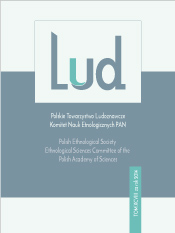Fabrykacja nierządnicy, czyli o ofiarach względnej swobody seksualnej na polskiej wsi przedrozbiorowej
The Fabrication of a Harlot, or, The Victims of a Relative Sexual Freedom in the Polish Village in Prepartition Times
Author(s): Tomasz WiśliczSubject(s): Sociology, Social history
Published by: Polskie Towarzystwo Ludoznawcze
Keywords: intersectionality; premodern village; courtship; premarital sex; illegitimate births; village poor
Summary/Abstract: In my earlier publications, I have described a relative sexual freedom in the Polish village in the prepartition period. It mostly applied to premarital intercourse to which rural community approached with certain acceptance, as long as no child was conceived. If it was, it was mostly the woman who was held responsible as a result of the “double standard”. However, the solution preferred by the public opinion was legalizing the relationship via marriage and rural courts could compel hesitant men to marry. Still, it resulted in some kind of optimism expressed by women who engaged in premarital sex. Nevertheless, there were also victims of the system, who, in consequence of their sexual practices, were thrown to the margins of their society or even were completely excluded from it. Obviously, those were almost exclusively women, but closer analysis shows that in their case, gender–based discrimination and class discrimination intersected. The goal of this article is to show the way in which the village society build their image of ‘harlots’ to justify their marginalization or exclusion. It was not only about the discursive fabrication but it also entailed real actions, the result of which was sexual stigmatization of some women of low social status, leading to their placement in categories such as ‘harlot’, ‘bastard’s mother’ or ‘infant killer’.
Journal: LUD
- Issue Year: 101/2017
- Issue No: 1
- Page Range: 129-148
- Page Count: 20
- Language: Polish

